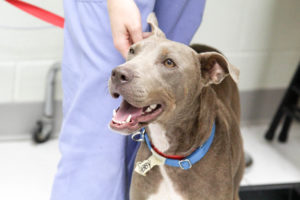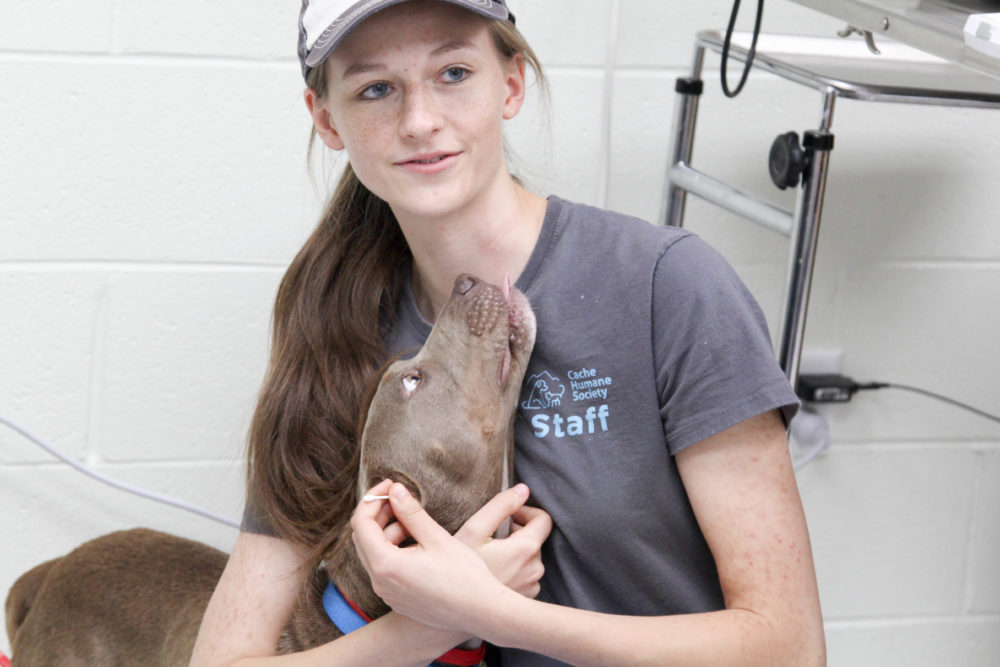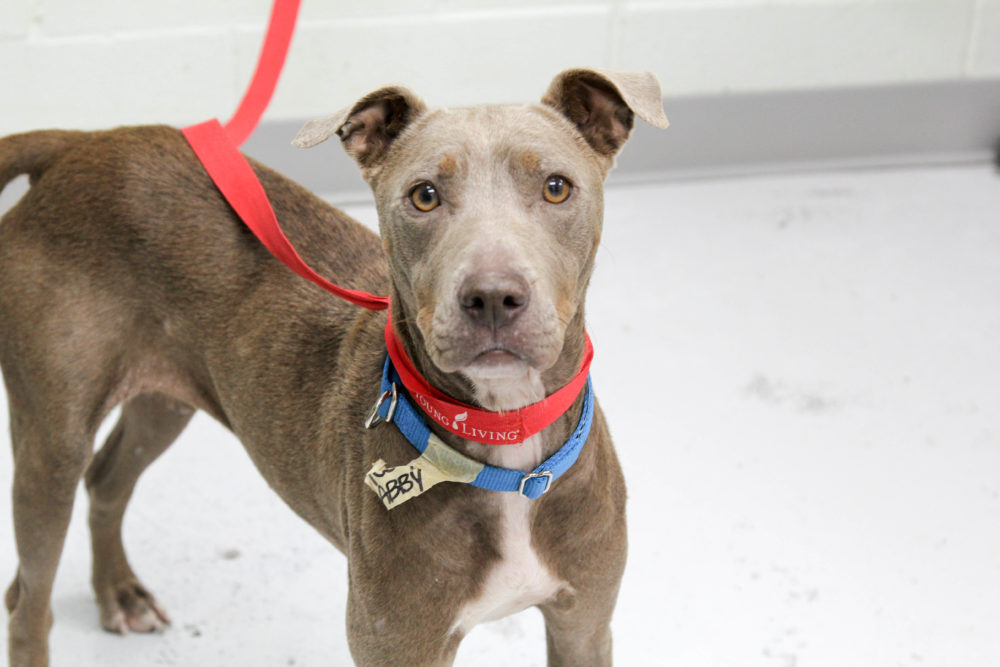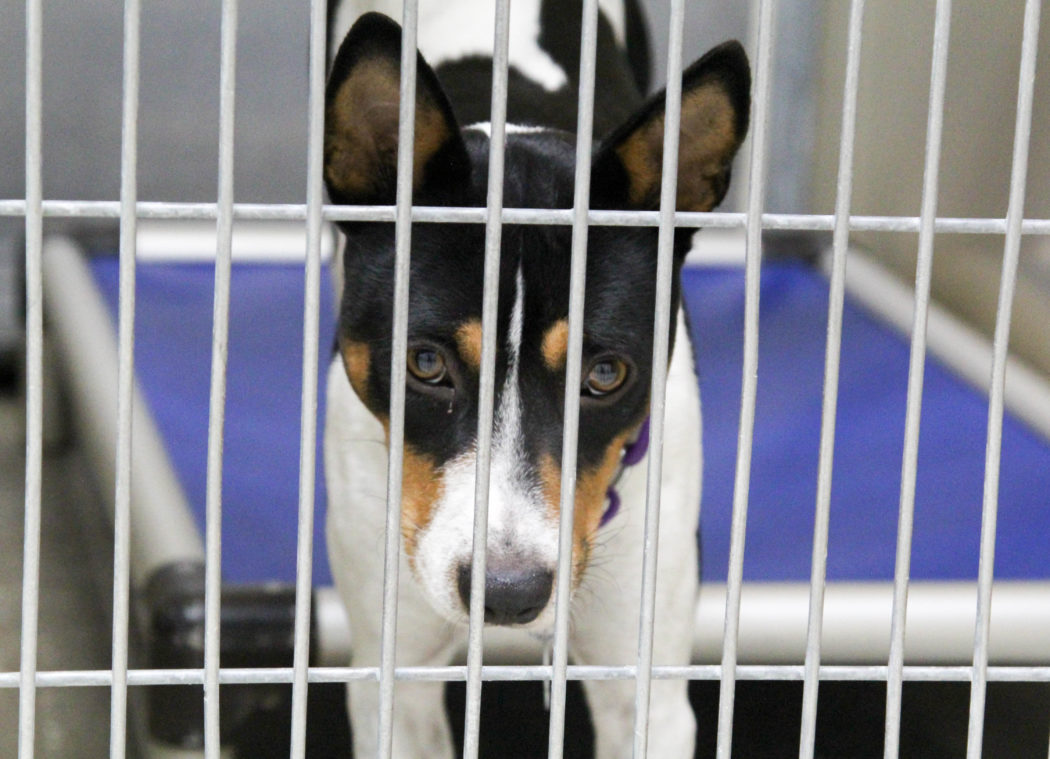Cache Valley Humane takes in shelter dogs from Texas
When Hurricane Harvey hit the coast of Texas, Best Friends Animal Society immediately went to help the relief efforts.
Two weeks later, the storm has passed and Houston – as well as the surrounding cities affected – are beginning to recover from the damage caused by the Category 5 hurricane.
Along with the flood of people who had to evacuate their homes, there are also thousands of pets who have been left behind or lost.
“They’re out of their homes, they’re away from their families, they’re stressed, they’re scared,” said Sadie Smith, the transfer coordinator for Cache Humane Society. “But Best Friends is down there rounding up those dogs and cats and animals and giving them a place to sleep and giving them food and care while they look for the families of these animals.”
Best Friends was founded in 2000 with the goal to end killing pets in Utah. Across Utah, the animal society brought together other animal organizations in a No-Kill Utah (KNUT) coalition.
To help return these lost pets to their owners, the coalition partners have decided to empty all of the shelters in the Houston area of current shelter animals to make space for all of those that had been displaced by Harvey, said Stacey Frisk, the executive director of CHS.
 Erica McNeill
Erica McNeill Abby, the dog, is happy as can be after her check up is done. All of the dogs at the shelter are spade/neutered, up to date with vaccines and are ready to be adopted.
Around 100 dogs already in shelters and up for adoption at the time of the hurricane’s arrival were sent to Utah earlier this week, Frisk said. Of these 100, seven were taken in by the Cache Humane Society. The rest of the dogs were divided up among the other members of the coalition and taken to shelters around the state.
“I think they’re being smart about it,” said Ashley Houston, a Utah State University senior in pre-veterinary medicine. “I mean, trying to get all the dogs that have been there for a while out of the shelters so that the new ones coming in are going to be more likely ones that have recently lost their families, been displaced.”
Houston recalled hearing about a situation during Hurricane Katrina where a lot of people wouldn’t evacuate because the evacuation buses wouldn’t let them take their animals with them. With Harvey, however, residents are being allowed to take their animals with them, helping more people leave.
“If someone said, ‘oh there’s a fire by your house,’ like the first thing I’m going to do is drive home and get my dog,” Houston said.
The Community Animal Welfare Society (CAWS), one of the oldest no-kill rescues in Utah, sent four vans to Texas to help transport the shelter animals and bring them to Utah. It’s a 20-hour drive from Houston to Salt Lake, Smith said.
When the dogs arrived in Cache Valley on Monday, there were a lot of volunteers present to help unload and comfort the stressed animals.
“We tried to bring them into this facility with a positive experience,” Frisk said
Smith said each dog that arrived was bathed, cuddled, vaccinated, microchipped, and spayed or neutered.
 Erica McNeill
Erica McNeill Ashley Houston is one of the clinic staff members who does the check ups with the dogs. The dogs temperature, skin, hair, and teeth are just a few of the many things that have to be checked for the dog to be cleared to be adopted.
Houston demonstrated the medical check-up process they performed on each new addition to the facility.
She brought in a young dog named Abby, who was numbered 1004 from the shelters in Texas.
First, Houston checked the dog’s gender and noted that she was not neutered. Abby was then checked for microchips and her age was estimated by looking at her body size, personality and teeth. Houston guessed Abby was around 10-11 months of age and a Staffordshire terrier or Pitbull mix.
Houston noted any markings and other physical features on the dog, then checked Abby’s eyes, ears and mouth. Finally, she checked her skin for ringworms under a black light and took her temperature.
Overall, Abby looked healthy.
After the dogs had their check-up, the next step was getting them into a foster home.
“Some of these dogs are coming in, they’re stressed. Some of them have injuries,” Frisk said. “Being able to send them into a home is really crucial.”
Now that the hurricane is over, rescue groups in Houston have committed to holding all displaced pets for 30 days, Frisk said. Animals who remain unclaimed for over one month will then be transferred to no-kill shelters like Cache Humane to find their next home.
“At the end of that month, we do anticipate thousands of dogs remaining unclaimed,” she said.
Cache Humane is equipped to hold up to 60 dogs. Knowing they will be taking more Texas dogs as the situation develops, Frisk asks community members to help by volunteering and donating supplies to the facility.
 Miranda Lorenc
Miranda Lorenc One of the dogs from the Houston, TX shelters is getting her check up at the clinic at the Cache Valley Humane Society animal shelter. Her shelter name is Abby.
Volunteer and foster home applications can be found online at CHS’s website, cachehumane.org.
A wish list of supplies can also be found on the website.
“The biggest thing we would love to have would be a bed for every dog coming in,” Frisk said. “Right now, we don’t.”
The best beds for use in the animal shelter are Kuranda beds, which are easy to keep clean. Foam beds can’t be sanitized, so the brand needs to be specific.
“That’s important to us just because we feel like they’ve been through so much,” she said.
– Miranda.lorenc@gmail.com
@miranda_lorenc

